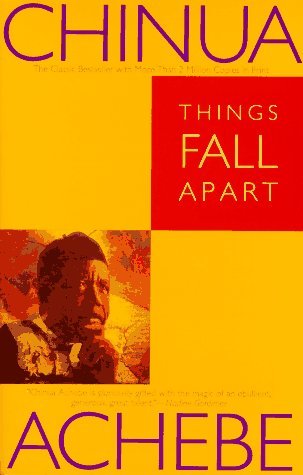 Things Fall Apart
Things Fall ApartChinua Achebe
Originally published 1959, I read Anchor Books 1994
209 pages, historical fiction, cultural encounter, colonialism, family
Found: been on my TBR stack for forever
I never had to read Things Fall Apart in school. Instead, we
read the incredibly racist Heart of Darkness (that book should be permanently retired from high school curricula) and the lovely Cry, The Beloved Country (note that both books were about Africa but written by white men. Sigh.). So this was the first time I read Chinua Achebe's novel which is generally
considered to be a classic of African literature, whatever that means. This is the second novel by a
Nigerian author that I have read, the other being this recent, pulpy book translated from
Hausa.
Things Fall Apart tells the story of Okonkwo, a respected
young man belonging to the pre-colonial Igbo community in present-day Nigeria. He is wealthy,
with three wives, large stores of food, and a place as one of the mediums in
the tribe’s spiritual council. Hotheaded and obsessed with protecting his dignity, he tries his hardest to be the manliest man in the tribe. But
when missionaries come and colonialism starts to change the social fabric of
the area, Okonkwo finds himself at a loss: how should he and the rest of his
tribe respond to these incursions? Will he be left behind by the changing
times?
Psychology and manliness
The most powerful aspect of this book is how Achebe goes
inside Okonkwo's mind, dissecting how he understands the world and, more
importantly, why he understands the world that way. Many of the things that
Okonkwo does are distasteful – beating his wives, killing his condemned
foster-son with his own hands, shaming his children – but they make sense (in a
twisted sort of way) when viewed from his perspective.
Most of Okonkwo’s insecurities stem from shame about his father, who was
widely considered to be a lazy coward. Okonkwo goes to the opposite extreme: he is overly aggressive and
angry, never permitting himself to show softer emotions. He always chooses
the most active, even cruel way to finish an argument or a fight, eventually resulting in him killing someone and being exiled from his tribe.
His insecurities also dictate how he treats his
children. His eldest son, in particular, is expected to be a hardened warrior.
Okonkwo will not tolerate any expression of “womanly” emotions because he is terrified
that he will raise a coward like his own father. When the missionaries come and
preach a message of peace, Okonkwo is outraged; when his son joins them, Okonkwo disowns him. It is unfortunate that Okonkwo is unable to shake off this fear, which makes him unable to show real feelings towards anyone.
Conforming to the Colonial stereotypes
Achebe's version of pre-colonial Nigeria often seemed to confirm all of
the exotic stereotypes about Africa. Okonkwo takes heads and drinks out of
skulls, the tribe uses barbaric forms of punishment, and spirits officiate over interpersonal
disagreements.
I think this was intentional on the part of the author – he
wanted to draw people in and then expose them to the critique of colonialism in the final half of the book. But I consider this to be a problem, since the novel is considered to be one of the first "authentic" African novels.
This novel is not aimed at an African readership; the way it is written and the stereotypes it conforms to are clearly aimed at a western readership. This is a novel protesting against colonialism, aimed primarily at the colonizers. I wouldn’t call it a novel that is African per se, but rather one that provides an African critique of colonialism in Nigeria.
This novel is not aimed at an African readership; the way it is written and the stereotypes it conforms to are clearly aimed at a western readership. This is a novel protesting against colonialism, aimed primarily at the colonizers. I wouldn’t call it a novel that is African per se, but rather one that provides an African critique of colonialism in Nigeria.
I didn’t particularly like this novel. And I should hope
that there are better novels by Nigerian and other African writers by now, ones
that do not conform so closely to the stereotypes about the continent. I
understand the historical significance of this novel, but I would not recommend it as a way to know Nigerian, or African, writing. While this book would have been a huge improvement over my high school reading list, I would rather see better, more recent novels taught to teenagers.
Things Fall Apart is available wherever books are sold.
Things Fall Apart is available wherever books are sold.
Further Reading
"The Sacrificial Egg," a short story by Chinua Achebe"Dead Men's Path," a short story by Chinua Achebe [pdf]
"Marriage is a Private Affair," a short story by Chinua Achebe [pdf]
No comments:
Post a Comment